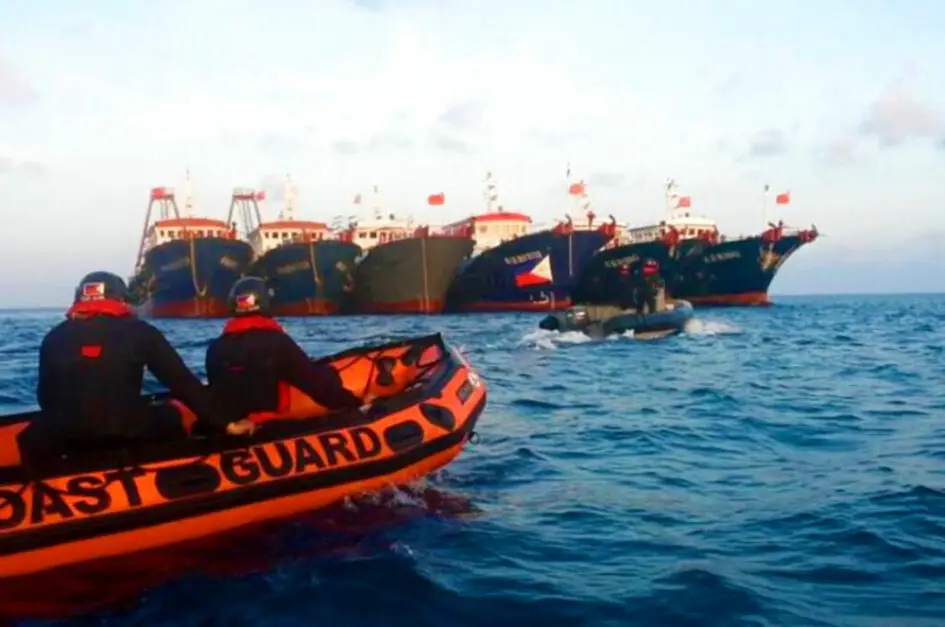There are fears China may take advantage of events in Ukraine to cement its grip on the waterway.
Source: Free Malaysia Today
JAKARTA: In the wake of Russia’s invasion of Ukraine, the 10 member states of the Association of Southeast Asian Nations (Asean) are nervous about the implications for the South China Sea dispute.
As Russia’s unilateral attempt to change the status quo overlaps with China’s aggressive moves in the South China Sea, they fear that if Russia’s actions are tolerated, there could be spillovers in their neighbourhood.
“What’s happening in Ukraine now is impt (important) to us. If international relations are based on ‘might is right’, the world will be dangerous for small countries. This is why SG (Singapore) staunchly supports international law & the UN Charter,” prime minister Lee Hsien Loong said in a Twitter post on Monday.
Cambodian prime minister Hun Sen and his Malaysian counterpart, Ismail Sabri Yaakob, exchanged views on the situation in Ukraine during their talks in Phnom Penh on Feb 24.
“Although we are far away and a small country, international issues such as this are very concerning to us,” Hun Sen was quoted as telling reporters with the Straits Times, an English-language newspaper in Singapore.
Asean members are no match for nuclear powers in terms of military strength.
If a military power like Russia attempts to expand its territory or territorial waters in defiance of international law, it would be difficult for any one of them to cope alone.
In a statement released today, Asean foreign ministers said they “are deeply concerned over the evolving situation and armed hostilities in Ukraine”, and called for “all relevant parties to exercise maximum restraint”, without blaming Russia explicitly.
When Russia seized Crimea from Ukraine in 2014, Asean issued no statement.
The UN General Assembly on Wednesday overwhelmingly adopted a resolution that “deplores in the strongest terms” Russia’s “aggression” toward Ukraine.
Among Asean’s 10 members, eight voted for the resolution, with Vietnam and Laos abstaining.
For Asean, experts say Russia’s invasion of Ukraine has parallels to China’s expansionist moves in the South China Sea, which they also see as a giant neighbour’s unilateral attempt to change the status quo.
“There is (a) concern that if the US is occupied with the conflict in Europe, China might fill the vacuum in Asia by either invading Taiwan or solidifying its presence in the South and East China Sea,” Gilang Kembara, a researcher at Centre for Strategic and International Studies Indonesia, wrote in a Jakarta Post op-ed.
In 2016, an international tribunal set up under the auspices of The Hague-based Permanent Court of Arbitration handed down a ruling rejecting China’s territorial claims in the South China Sea, in a case brought by the Philippines.
China ignored the court’s decision, calling it “waste paper”, and has since continued to press ahead with the militarisation of the South China Sea.
According to the Indonesian coast guard, it has been on high alert in waters around the country’s Natuna Islands since before Russia’s invasion of Ukraine.
That is because Indonesia’s 200 nautical mile exclusive economic zone around the islands overlaps with the “nine-dash line” claimed by China as its own border in the South China Sea, pitting the two countries against each other.
Regarding the Ukraine crisis, a Vietnamese foreign ministry spokesman also called for the observation of international law and urged parties concerned to make diplomatic efforts.
Vietnam’s ruling Communist Party, has had deep relations with Russia since the Soviet era.
It is unusual for Vietnam to publicly refer to international matters involving Russia.
Because Vietnam is locked in a territorial dispute with China in the South China Sea, the Southeast Asian country may have spoken out, alarmed the Ukraine crisis may spill over into its region.
A senior Asean diplomatic source pointed out similarities between now and 2014, when Russia annexed Crimea.
At the time, US president Barack Obama could not stop Crimea’s takeover by Russia, and his Democratic Party lost in midterm elections a few months later.
As a result, the Obama administration was weakened politically, while China stepped up its activities in the South China Sea.
Similarly, if the Biden administration cannot halt Russia’s invasion of Ukraine, some pundits say the Democratic Party will face an uphill battle in this autumn’s midterm elections, and China could further cement its control in disputed waters.
The White House announced on Feb 28 that president Biden will hold a special summit meeting with Asean leaders in Washington on March 28 and 29.
Although dealing with China will be high on the agenda, Biden is also expected to take up the Ukrainian situation and call for cooperation from Asean leaders.
Japanese foreign minister Yoshimasa Hayashi also held talks on Monday with the Asean ambassadors in Japan and affirmed the close cooperation between the two sides to cope with common challenges, including Russia’s invasion of Ukraine.






Good evening brother. I don't know anyone you mentioned above but I can sensed the hurt that you are going…
Please confine your comments to the subject of this post, i.e. a preacher caught lying in daylight. It is none…
"And also, from this line of reasoning given by Christina Ang, what about the score of believers who died from…
Benny Hinn has been spinning fraud messages ever since he started his ministries. He's been using Christian principles to gain…
Thanks for picking up on my comment made in an earlier post. Now, we know why genuine Christians will be…